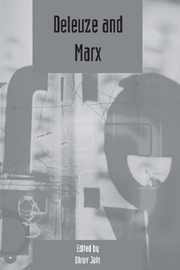Book contents
- Frontmatter
- Contents
- Editor's Introduction
- Articles
- Deleuze, Marx and the Politicisation of Philosophy
- The Marx of Anti-Oedipus
- Marx as Ally: Deleuze outside Marxism, Adjacent Marx
- The Fetish is Always Actual, Revolution is Always Virtual: From Noology to Noopolitics
- Minor Marxism: An Approach to a New Political Praxis
- Politicising Deleuzian Thought, or, Minority's Position within Marxism
- Review Essay
Marx as Ally: Deleuze outside Marxism, Adjacent Marx
from Articles
Published online by Cambridge University Press: 12 September 2012
- Frontmatter
- Contents
- Editor's Introduction
- Articles
- Deleuze, Marx and the Politicisation of Philosophy
- The Marx of Anti-Oedipus
- Marx as Ally: Deleuze outside Marxism, Adjacent Marx
- The Fetish is Always Actual, Revolution is Always Virtual: From Noology to Noopolitics
- Minor Marxism: An Approach to a New Political Praxis
- Politicising Deleuzian Thought, or, Minority's Position within Marxism
- Review Essay
Summary
Abstract
Deleuze reworks Marxist concepts in order to identify those that represent discontinuity and produce a theory of revolution. Marx is important because, along with Spinoza and Nietzsche, he is a part of a project to leave behind concepts such as transcendence and univocity which underlie the totalitarianism of traditional philosophy. Deleuze is looking for concepts that might form a different theory, within which the structures of production are not organised vertically by the domination of universal concepts, such as ‘being’ or ‘essence’, but flow horizontally through a multiplicity of relations of conceptual singularity. The production of a different series of concepts is a strategic and tactical operation that, in confronting prior notions of transcendental philosophy, turns philosophy itself into a battlefield. Marx provides the general methodology for this tactical approach through two fundamental categories: production and conflict. Deleuze practises Marx's theoretical method and by using Marx's own central concepts challenges traditional Marxism, to arrive at a totally different and revolutionary philosophical structure based on concepts such as those of force, variation, difference, singularity, production and the war machine.
Keywords: Conflict, production, forces, linking, battlefield, substance, immanence, transformation
Marx is at our side. That is to say, to reconstruct a thought worthy of a possible revolution means to cross the threshold of Marx. He has always been thought of as the eldest brother who, representing the beginning of a lineage, assigned and distributed roles and positions within a family tree.
- Type
- Chapter
- Information
- Deleuze and MarxDeleuze Studies 2009 (Supplement), pp. 53 - 77Publisher: Edinburgh University PressPrint publication year: 2010



